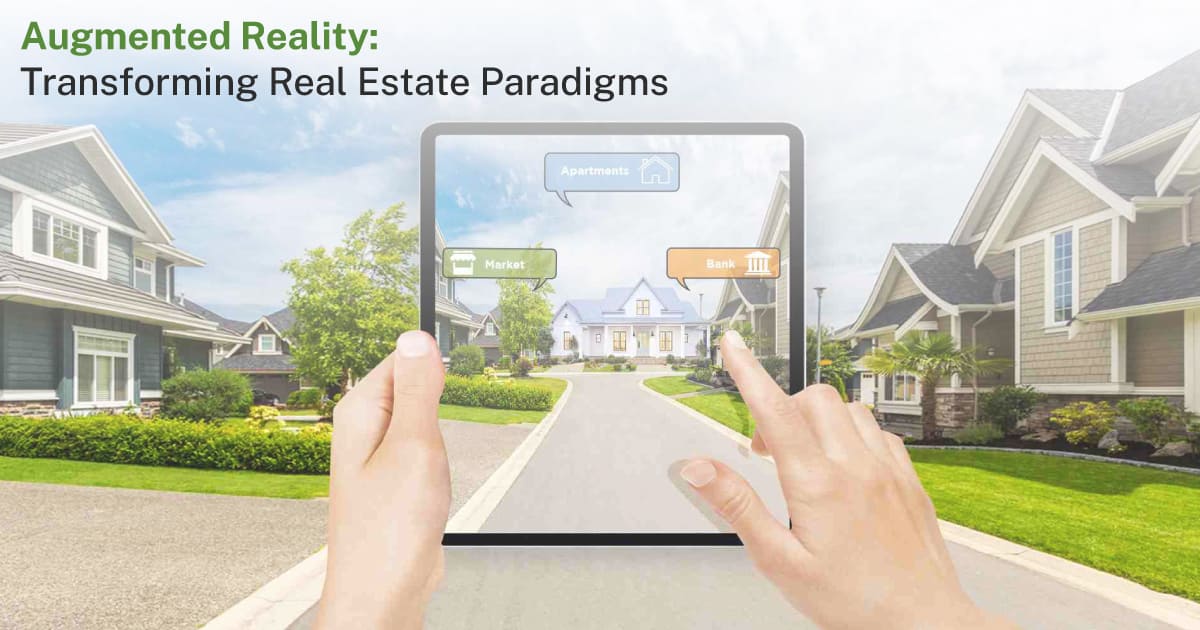
Augmented Reality: Transforming Real Estate Paradigms
We live in a world that is constantly changing owing to the constant leaps we are making on the technological frontier. The pandemic has only served to accelerate the rate of change and the role technology is poised to play in shaping our future in an increasingly contactless world. With the advent of Industrial Revolution 4.0, Industrial Internet of Things (IIoT), Machine Learning, and Generative Artificial Intelligence (AI), technology has revolutionised the very way we work, communicate, and live.
One technology in particular that has been making waves in recent times and has been pervasively adopted by many industries is augmented reality (AR). This is especially true for the real estate sector, which has leveraged AR to enhance the customer experience, efficiency, and transparency. In this blog, we will delve into the intriguing world of AR and how it has forever altered the dynamics of the real estate industry. But first, let’s understand what augmented reality actually is.
Essentially, augmented reality is the user’s real-world experience integrated with digital information that can be experienced in real time. As opposed to virtual reality, which is tangential to the user’s experiencing a completely virtual world, augmented reality fundamentally overlays the user’s real life with virtual elements such as sound, imagery, and other sensory elements. Blurring the line between real and digital, augmented reality works to enhance the user experience by turning your immediate surroundings into an interactive learning environment.
At present, augmented reality is being utilised in various applications and industries, facilitating granting competitive advantage, decision-making, problem solving, fast tracking of employees, and overall optimising the functioning of organisations. From manufacturing to healthcare to gaming, nearly every industry today is utilising augmented reality technology, keen to capitalise on its many benefits. It comes as no surprise that in a sector such as real estate, which is completely fixated on transforming vision into reality, augmented reality has done wonders, allowing innovators to bring their vision to life.
Let us discuss some ways this technology has transformed the way we market, experience, and view real estate.
Competitive Edge
For real estate players, AR is so much more than just a technological tool, as it grants them the ability to pique customers’ curiosity. The tool makes property viewing a dynamic and interactive event, as it allows realtors to personalise experiences to the potential buyer’s needs. As this trending technology allows users to place virtual elements over existing reality, it allows buyers to visualise what the property would actually look like.
For instance, with this paradigm-shifting technology, users can actually view how a new piece of furniture, certain wallpaper, or any other renovation will actually look, adding a layer of perceived corporeality to the experience. With humans being innately sensory creatures, this technology is likely to foster a deeper connection with properties, thereby expediting sales. Not only that, with virtual tours powered by AR, buyers can set the pace of property exploration by inspecting the areas that matter to them to their hearts’ content, thereby increasing comfort and reliance.
A recent study by the Journal of Real Estate reaffirmed this by stating that properties that have virtual tours available received 40% more traffic and 49% more qualified leads than those with only images, leading to increased engagement and sales.
Maximising Operational Efficiency
While AR has indeed been a game changer when it comes to property viewing and marketing, it also offers many advantages to hone operational efficiency. For instance, AR can help developers and architects overlay virtual plans on real-life properties, enabling them to visualise what the final construction would look like.
In addition to this, AR tools today also have collaboration or conferencing options that enable individuals like developers, architects, and clients sitting in different locations to conduct a virtual tour of property together, promoting real-time decision-making.
Not only this, AR can be infinitely helpful in the maintenance phase as it enables developers to spot any existing or potential construction problems, thereby enabling a quick and seamless repair process and increasing buyer or tenant satisfaction.
Enhancing Marketing
When it comes to real estate marketing, AR applications have fundamentally revolutionised this world. Not only has this technology made property tours a much more interactive experience, bringing magnificent visions to life, but it has also added ease and convenience to this experience. Today, a client sitting in the United States of America can remotely tour properties in India in a comprehensive and engaging manner, unlocking a whole world of heretofore untapped markets.
In addition to this, utilising AR in marketing allows buyers to immediately scan all the requisite information, such as property specifications, amenities, location advantages, etc., making the property buying process seamless. Enhancing the customer experience, AR adds novelty to the process of property tours, increasing the memory retention of buyers and leading to higher sales.
In conclusion, augmented reality has revolutionised the real estate industry, redefining marketing strategies, enhancing customer experiences, and maximising operational efficiency. As we embrace this dynamic technology, the future of real estate promises not just innovation but a seamless fusion of the virtual and the real, creating immersive and personalised journeys for property buyers around the world.



